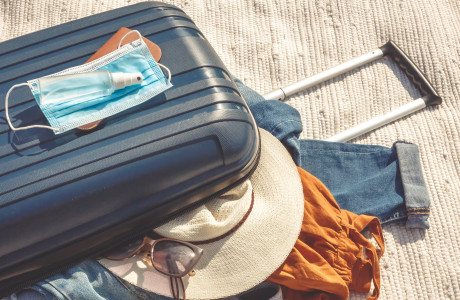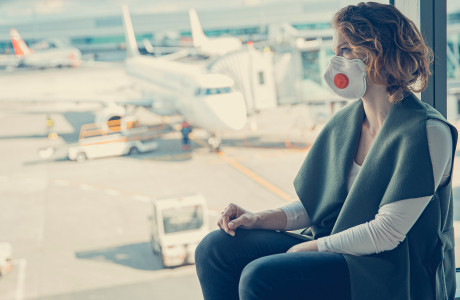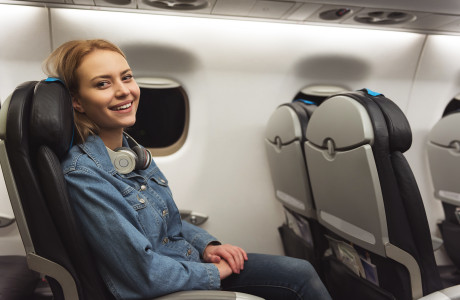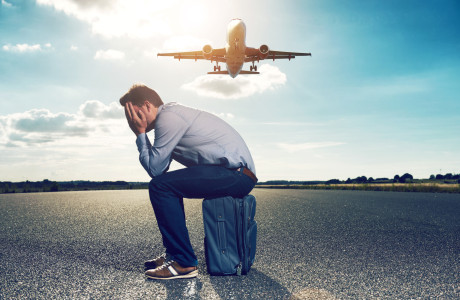
What to do when you have a fear of flying?
For many, boarding a plane is associated with a joyful holiday feeling. But what if instead there is a queasy feeling in the stomach, sweating or even panic attacks? Because about 15% of Germans are affected by fear of flying when travelling. But how does the fear of flying actually arise and how can it be overcome? Our tips for more relaxed flying.
Overview
What is fear of flying?
Fear of flying is also known as aviophobia and refers to severe, persistent anxiety that occurs when flying and boarding an aircraft. The fear of flying can develop in sufferers weeks or days before departure and trigger various symptoms that can range from an uneasy feeling in the stomach to serious panic attacks. The causes for the occurrence of fear of flying can be manifold and often difficult to fathom. Depending on the severity, it is experienced as differently stressful and restrictive - in any case, however, aviophobia gives the sufferer an unpleasant travel experience.
Symptoms and causes of fear of flying
Symptoms triggered by fear of flying can manifest themselves both physically and psychologically:
Physical symptoms: can be, for example, a strong heartbeat and faster breathing, or abdominal pain and stomach problems. People affected by fear of flying also often experience trembling and dizziness, as well as general physical discomfort.
Psychological symptoms: These include severe anxiety, restlessness and sleep problems, which can occur both before and during the flight.
Extreme symptoms: In the worst case, one or more symptoms of fear of flying can also end in a panic attack, which can be characterised by breathing difficulties, feelings of suffocation and being overwhelmed. Such an attack can further fuel the fear of flying in those affected.
Fear is generally something quite natural and refers to the body's own physical and psychological reaction to a dangerous situation. Flying in an aeroplane does not actually pose a direct danger to us humans, but it does trigger an overproduction of stress hormones in people suffering from fear of flying. The causes can be manifold:
Bad experiences: These were made during a previous flight due to turbulence or take-off and landing complications.
Fear of heights or space: These, like fear of large crowds, can exacerbate aviophobia.
Surrender of control: many are afraid of putting their lives in the hands of pilots.
Dangerous situations: : There is a fear of crashing or being hijacked.
Insufficient knowledge: There is a feeling of not having enough understanding towards the complex technology of an aircraft.
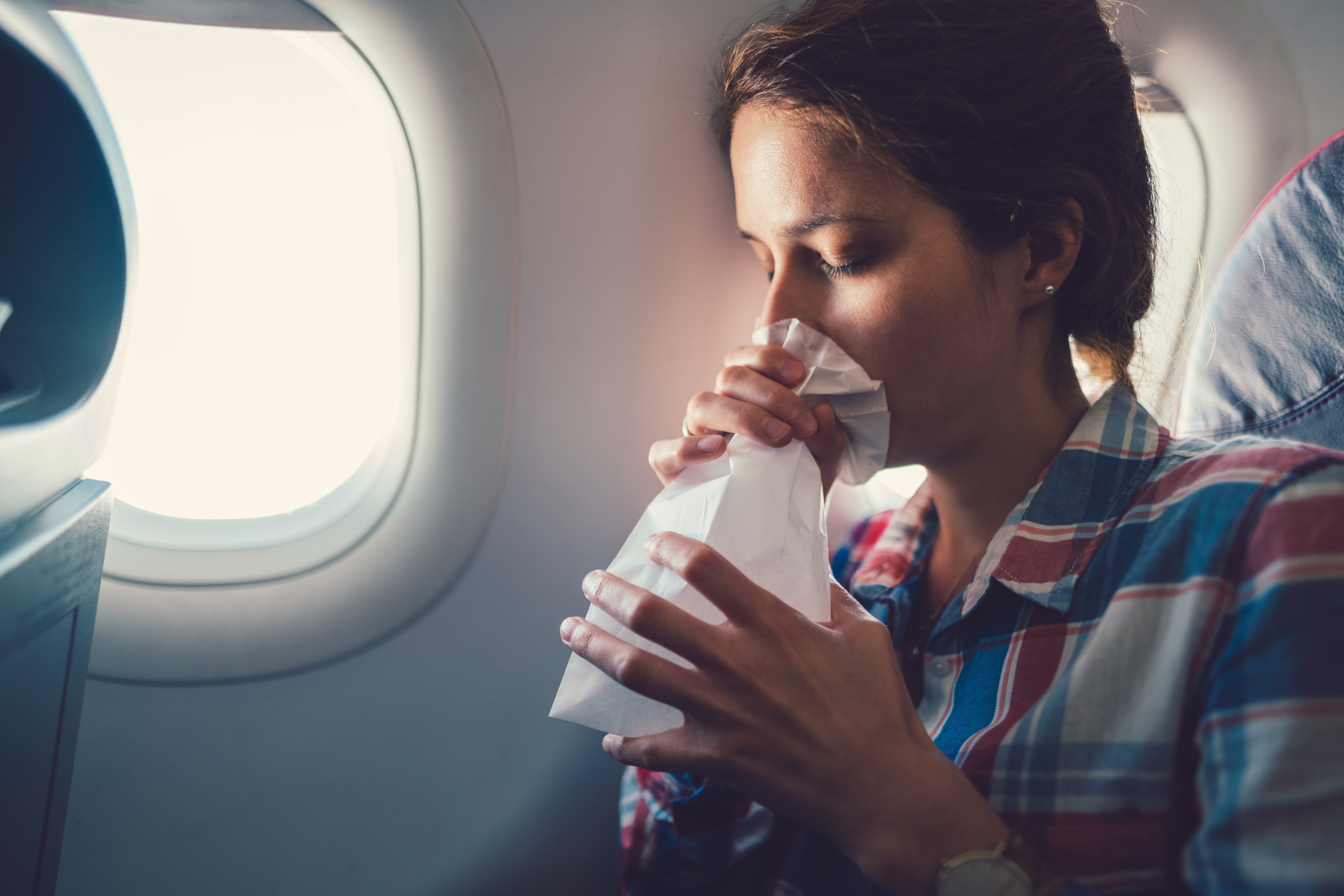
Tips and remedies for fear of flyin
If you experience fear of flying, the following tips may promise relief from symptoms and make your next trip a little more enjoyable:
fear of flying tip: minimise stress in advance
Plan extensively in advance for all the steps you need to take before boarding the flight. Checking in online, choosing an optimal seat and allowing enough time to travel to the airport can help you combat your fear of flying. This will save you unnecessary stress before you even start the actual journey and an orderly process will give you a stronger sense of control. If you book a parking space at the airport in advance, for example, you save yourself a nerve-wracking search for a parking space.fear of flying tip: Find out early on
How long is the flight, where is the gate and will the flight even take place? Finding out in advance can help you overcome your fear of flying and make your journey more relaxed. Furthermore, informing yourself in advance about technical data and the safety of an aircraft can reduce nervousness.
By the way: The aeroplane is considered the safest means of transport in the world!fear of flying tip: Distraction before and during the journey
Make sure you have a busy schedule in the weeks leading up to your departure. Note: you should still plan enough time for tips #1 and #2, of course. To reduce your anxiety while flying, keep several entertainment options open in advance. Download your favourite series, an entertaining film or good music to your smartphone or tablet so you don't have to rely on the airline's entertainment. Take an exciting book or an entertaining magazine with you. Or focus on things like Sudoku or crossword puzzles. If you are not travelling alone or have a nice stranger sitting next to you, talking about completely different topics can also be a good distraction.fear of flying tip: Tell others about your fear of flying
Telling the flight crew or your companion about your fears can be a real help against fear of flying. Just sharing your thoughts can help ease your tension.fear of flying tip: Eating and drinking consciously
Buy a bottle of water at the duty-free shop and bring your favourite biscuits on board. To manage your fear of flying, conscious eating and drinking can be an important key. If you feel a loss of appetite before departure, try eating a piece of fruit. This way you won't put unnecessary strain on your digestion, but also prevent an empty stomach from fuelling the uneasy feeling of your fear of flying even further.fear of flying tip: Proper clothing and equipment
A helpful remedy for fear of flying is to wear appropriate clothing. It is best to put on several layers of comfortable clothing so that you are well prepared for temperature fluctuations. By the way: a pair of thick socks or a neck pillow can also help to make your flight a little more comfortable and thus reduce your fear of flying.
Fighting fear of flying yourself - 3 relaxation exercises
If possible, please refrain from taking medication for fear of flying. Calming medications only have a temporary effect and can even lead to a chronicisation of the anxiety in the long run. Alternatively, however, there are some relaxation exercises that you can easily learn yourself to overcome your fear of flying.
exercise: Breathing
Conscious, deep breathing in and out can be very helpful. The so-called abdominal breathing plays an important role here. Place your hands on your belly below your navel and notice how it rises and falls as the air flows in and out. Try to breathe slowly and in a controlled way, concentrating only on yourself.exercise: Progressive muscle relaxation
Tense all muscle groups one after the other and then relax them again. The resulting physical relaxation can not only relieve physical symptoms of fear of flying, but also calm your stream of thought.exercise: Mental training
Consciously control your own thoughts and repeat in your mind how safe flying is. These positive affirmations can help develop an optimistic attitude towards flying. It can often be helpful to learn these exercises from specially trained therapists.
If you experience particularly severe anxiety during or before flying and the self-exercises just mentioned do not promise relief either, please do not hesitate to seek professional help for fear of flying.
Conquering fear of flying with therapy: Professional help for fear of flying
In particularly severe cases, it may make sense to start therapy for fear of flying. Many airlines now offer professional seminars against fear of flying, and specially trained therapists are also able to teach relaxation methods and strategies for overcoming the fear of flying. Behavioural therapy can also be helpful: By permanently changing thoughts and patterns of experience and behaviour, an attempt is made to relieve those affected of their fear of flying. The aim is to reduce the rejection attitude and fear reaction that arise when boarding an aircraft. To do this, patients are enabled to gain control over their anxiety through certain fear confrontation exercises, so that the physical and psychological symptoms associated with the fear of flying subside.
There is no shame in needing professional help for a full-blown anxiety disorder like aviophobia - quite the opposite. There are more people who suffer from fear of flying than you think. Therefore, do not shy away from openly communicating your fears!

